Table of Contents

Registered Nutritional Therapist Lorna Driver-Davies offers suggestions on which foods can help endometriosis
It has no known cure and causes crippling pain for one in 10 women who suffer with it.
But experts say simple dietary changes – in addition to pain medication and hormone therapy – can help millions fight endometriosis.
Here, registered nutritional therapist Lorna Driver-Davies explains why eating more fatty fish and fiber, while cutting out processed foods and even coffee, could in theory make symptoms more manageable.
More fish
Ms Driver-Davies, who works with supplement company Wild Nutrition, advises women diagnosed with endometriosis to eat a ‘proper portion’ of oily fish each week to boost their omega-3s.
This, she says, is not equivalent to ‘a few sushi rolls’.
Because omega-3 has anti-inflammatory properties, Ms Driver-Davies claims it ‘will help to reduce symptoms’. Similar claims are being pushed out by NHS bodies.
Considered an inflammatory condition, endometriosis occurs when tissue similar to the lining of the uterus grows elsewhere in the body.
This can block the fallopian tubes (the tubes the egg travels down to reach the uterus) or form scar tissue, which can make it harder to get pregnant.
It causes pain as the tissue builds up and then breaks down, just as the lining of the uterus does each month.
Salmon, mackerel and sardines are all examples of fatty fish that are rich in omega-3s, which have been shown to be good for the heart.
To get enough omega-3, the NHS recommends eating at least two portions of fish a week – one portion of which is fatty fish.
Other sources include flaxseed oil, walnuts and eggs.
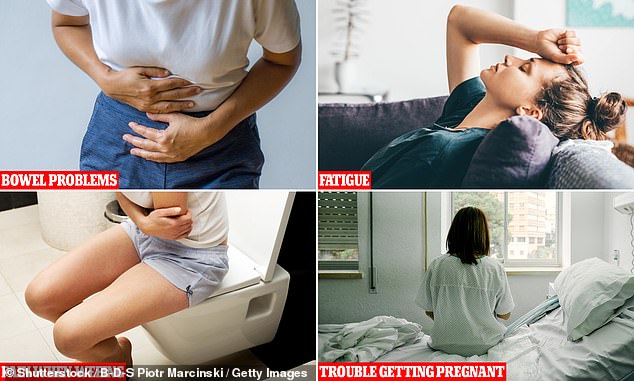

Endometriosis, which affects 176 million women worldwide, causes tissue similar to the lining of the uterus to grow outside the uterus, causing inflammation and pain. It can also cause intestinal problems, fatigue, difficulty conceiving and pain with tears
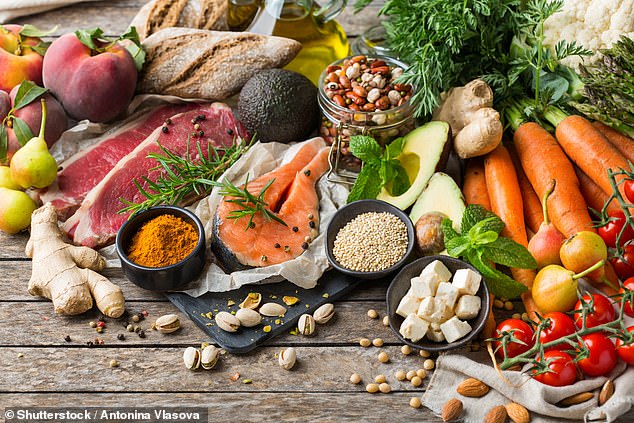

A food that will give the immune system a healthy boost and can reduce symptoms of endometriosis is fatty fish because it is high in omega-3
More vegetables
Eating more vegetables is never a bad idea.
But according to Ms Driver-Davies, it could really help women with endometriosis.
Estrogen encourages endometriosis tissue to grow and shed wherever it appears in the body. As such, treatment may revolve around limiting estrogen to shrink rogue tissue.
“Vegetable fiber is important in endometriosis to keep bowel movements regular,” says Ms Driver-Davies, who specializes in hormone and gynecological nutrition.
‘And this helps ensure that estrogen is removed and not built up.’
Research from 2019 published in the journal Nutrients shows that eating fiber reduces the absorption of estrogen. This is also repeated in a breast cancer in 2021 examination.
“Fiber also helps feed the gut microbiome necessary for a healthy immune system.”
Ms Driver-Davies specifically recommends cruciferous vegetables such as broccoli, cauliflower and Brussels sprouts.
Such advice is repeated by the NHS because it is ‘loaded’ with sulforaphane.
The antioxidant is known to fight inflammation, according to advice published by Worcestershire Acute Hospitals NHS Trust.
Less red meat
Eating too much red meat has been suggested to make endometriosis worse.
At least this is because, according to the NHS, it ‘can promote inflammation in the body’.
“Many studies show that women who have endometriosis had less pain and fewer symptoms if they took out meat or cut down on meat,” says Ms Driver-Davies.
For example a 2018 examination suggested women could reap the greatest benefit by sticking to just one portion of red meat a week,
Some women with endometriosis choose to cut it out completely.
But Ms Driver-Davies warns against rushing to cut it out of your diet because it is rich in vitamins and nutrients including iron and B12.
Heavy menstrual bleeding caused by the condition can deplete sufferers of iron, which can cause fatigue.
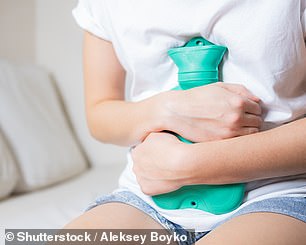

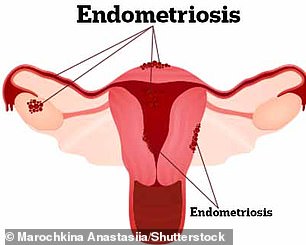

Endometriosis is a condition in which tissue similar to the lining of the uterus grows elsewhere, including the ovaries, fallopian tubes and bowel. It responds and grows when exposed to the female hormone oestrogen, according to Endometriosis UK. Therefore, an accumulation of the hormone can make the condition worse
Less dairy products
For some women with endometriosis, reducing or cutting out dairy products may also be beneficial.
“Dairy can be problematic for some and fine for others, so it’s worth experimenting,” says Ms Driver-Davies.
‘The types of dairy vary, and some sufferers find that they feel better drinking A2 cow’s milk (now commonly found in supermarkets) or replacing cow’s milk with goat’s milk.
“If you eliminate dairy, you may need to supplement with calcium and iodine.”
However, the link between dairy products and endometriosis is inconclusive, according to charity Endometriosis Australia.
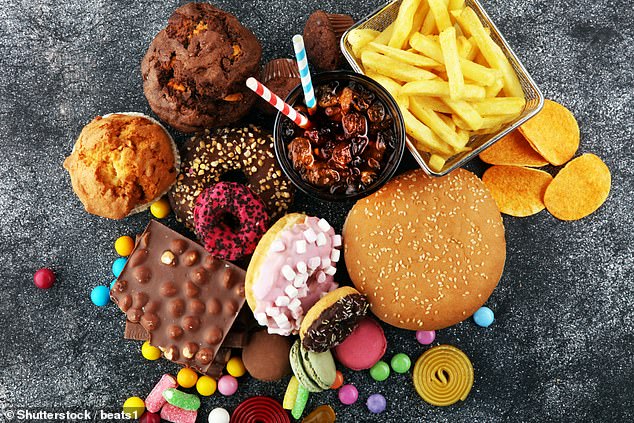

Deep-fried foods such as fish and chips, sugary processed foods and alcohol can make people with endometriosis feel more pain
Sugar, alcohol and processed foods
Deep-fried food such as fish and chips can only worsen the pain, according to Ms Driver-Davies.
By the same logic, sugary processed foods and alcohol are also potentially off the cards.
Studies have shown that women who consume more trans fat – predominantly found in fried and processed foods – are more likely to have endometriosis.
Similar links have also been found with booze as shown in a 2022 examination published in Scientific Reports.
“Sugar and alcohol are both inflammatory ‘anti-nutrients’ and processed foods contain ‘bad’ fats that can create more inflammation, contain unnatural substances and preservatives,” says Ms Driver-Davies.
Your liver breaks down estrogen, but if your liver isn’t working properly, for example if you’ve been drinking alcohol, too much estrogen can build up, according to the Cleveland Clinic.
‘When you consume alcohol, the body will use all its resources to detoxify the alcohol rather than estrogen.
“Cutting it out or cutting back will allow the body to use its resources to support symptoms and the disease,” adds Ms Driver-Davies.

